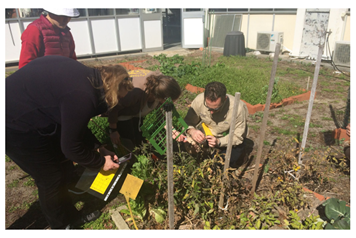New dedicated taskforce to stop the spread of Tomato potato psyllid
By Your Levy @ Work

Workshop participants inspecting tomatoes infested with tomato potato psyllid, and collecting sticky traps, at DPIRD in South Perth, Western Australia.
Workshop participants inspecting tomatoes infested with tomato potato psyllid, and collecting sticky traps, at DPIRD in South Perth, Western Australia.
Australia’s nursery industry now has a network of expert psyllid entomologists armed with knowledge and skills to detect and manage a Tomato potato psyllid (TPP), Bactericera cockerelli infestation.
The taskforce is trained in exotic Psylloidea identification, particularly TPP identification and TPP surveillance techniques.
TPP is an exotic pest that was first detected in Perth, Western Australia, in February 2017, after establishing itself in New Zealand in 2006 and Norfolk Island in 2015.
As one of the world’s most destructive horticultural pests, the tiny sap-sucking insect poses a significant risk to the nursery industry as it reduces crop yield and spreads the bacterial plant disease ‘zebra chip’ in potatoes, caused by Candidatus Liberibacter solanacearum (CLso) bacterium.
The taskforce is an outcome from the levy-funded project, ‘National tomato potato psyllid and zebra chip surveillance’ program (MT18008). Led by the Department of Primary Industries and Regional Development, Western Australia, and funded by Hort Innovation, the program commenced in 2019, aiming to support critical national surveillance, identification, and reporting programs for TPP and CLso across Australia.
As part of the surveillance project, the team distributed 16,885 sticky traps nationwide, and 80.4% (13,590) were returned and assessed for exotic Psylloidea. Outside of Western Australia, no TPP, CLso or other priority exotic psyllid was positively detected.
This is the first time that the status of TPP in Australia has been determined across 7 states or territories (surveillance was not conducted in ACT).
The team implemented an ‘Adopt-a-trap’ program, where Residents across metropolitan area and surrounds could help combat TPP by hosting a ‘sticky trap’ in their backyard and receive a free plant for their efforts.
Through these surveillance efforts, the team in Western Australia discovered that TPP had spread to the regional areas of Albany, Geraldton and Carnarvon from the Perth metropolitan region.
So in order to continue to protect the Australian nursery industry, the dedicated taskforce has developed reference materials for state biosecurity agencies on TPP and Asian citrus psyllid.
For growers interested in learning more about the surveillance program and reference materials, visit: https://www.horticulture.com.au/growers/help-your-business-grow/research-reports-publications-fact-sheets-and-more/mt18008/.

Lifecycle of Tomato Potato Psyllid Bactericera cockerelli showing an egg, 1st instar nymph, 5th instar nymph, exuvia and different coloured adults. Not shown are 2nd, 3rd and 4th instar nymphs
Lifecycle of Tomato Potato Psyllid Bactericera cockerelli showing an egg, 1st instar nymph, 5th instar nymph, exuvia and different coloured adults. Not shown are 2nd, 3rd and 4th instar nymphs
The ‘National tomato potato psyllid and zebra chip surveillance’ (MT18008) project has been funded by Hort Innovation, using the potato, nursery and vegetable industry research and development levy and contributions from the Australian Government.



